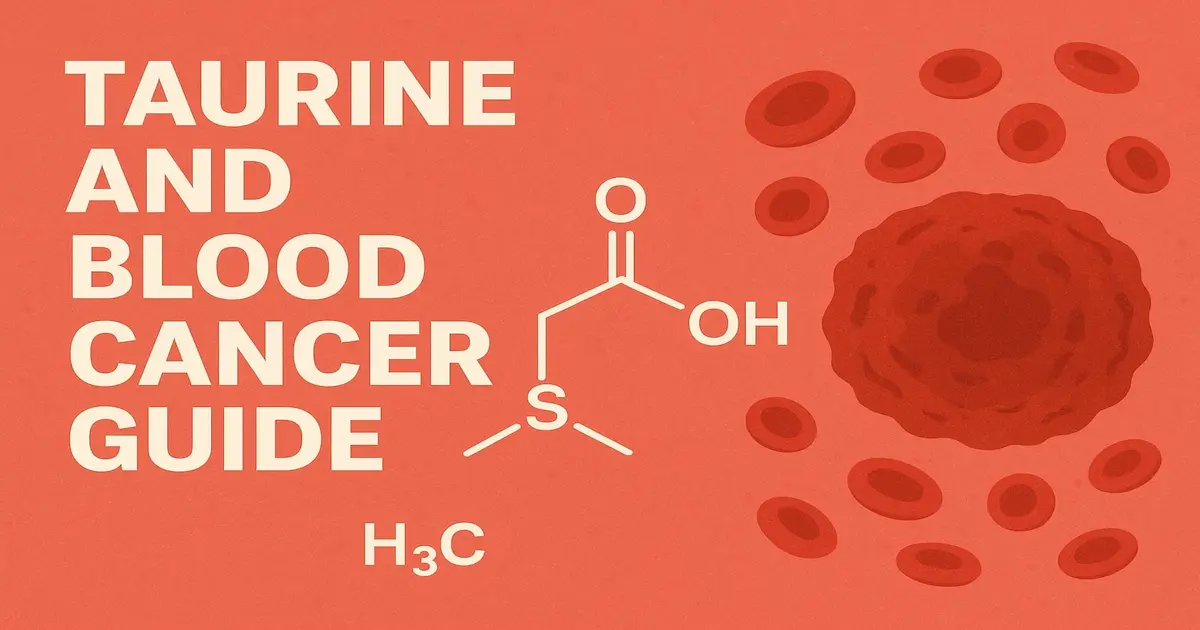Taurine and blood cancer are two terms that may not appear connected at first, but recent medical research has started exploring their relationship.
Taurine is an amino acid that occurs naturally in the body, and blood cancer is a group of serious conditions that disrupt the normal functioning of the blood and bone marrow.
The interest in taurine comes from its potential biological effects, including antioxidant and cell-regulating properties, which may play a role in cancer biology.
Blood cancers such as leukemia, lymphoma, and myeloma affect thousands of individuals every year. These conditions weaken the immune system, cause abnormal blood cell production, and can be life-threatening without proper treatment.
With growing interest in alternative approaches to complement modern treatments, taurine has been highlighted as a possible compound that could support therapy or patient well-being.
In this article, we will explore taurine and blood cancer in detail, reviewing the science, treatment, patient perspectives, financial aspects, and lifestyle considerations.
The goal is to provide readers with a well-rounded understanding of how taurine may connect to the field of blood cancer research and care. Lets dive in!
What is Taurine and Why It Matters
Taurine is a sulfur-containing amino acid found in the human body, particularly in the brain, heart, retina, and muscles.
Unlike essential amino acids, taurine is considered a “conditionally essential” amino acid because the body can produce it in small amounts, but under certain conditions such as illness or stress, supplementation may be required.
Taurine plays several important roles in the body. It helps regulate calcium signaling in cells, supports bile salt formation for digestion, stabilizes cell membranes, and contributes to the antioxidant defense system.
These roles are vital in protecting cells from oxidative stress and maintaining overall health.
From a nutritional perspective, taurine is found in foods like fish, meat, and dairy. Energy drinks also often contain taurine, though in amounts higher than what is naturally obtained through diet.
Scientists have been particularly interested in taurine because of its anti-inflammatory and immune-modulating properties.
These potential benefits are significant because blood cancers involve abnormal growth of blood cells, DNA damage, and immune system disruptions.
Taurine’s ability to support cell integrity and combat free radicals could be relevant in reducing some of the cellular damage associated with cancer progression.
Read More: The Rise of Gut-Health Issues in Urban India: A Complete Guide 2025
Blood Cancer: Causes, Risk Factors, and Symptoms
Blood cancer, also referred to as hematologic cancer, originates in the bone marrow where blood cells are produced. Instead of developing normally, blood cancer cells grow uncontrollably, crowding out healthy cells and impairing immune function.
There are three main types of blood cancer:
- Leukemia: affects white blood cells and is common in both children and adults.
- Lymphoma: affects the lymphatic system, which is vital for immune defense.
- Myeloma: begins in plasma cells, another type of white blood cell.
Causes and Risk Factors
The exact causes of blood cancer are not fully understood, but several risk factors are known:
- Genetic predisposition: A family history of cancer increases the risk.
- Exposure to radiation or chemicals: Prolonged exposure to benzene and other carcinogens may trigger mutations.
- Weakened immune system: Patients with autoimmune diseases or HIV are at higher risk.
- Age: Certain blood cancers like chronic leukemia are more common in older adults.
Symptoms
Early detection is critical, yet symptoms often mimic less serious illnesses. Common signs include:
- Persistent fatigue and weakness
- Frequent infections
- Unexplained weight loss
- Swelling of lymph nodes
- Easy bruising or bleeding
- Bone pain or tenderness
Blood cancer is a challenging diagnosis because of its subtle onset and wide range of subtypes. This is why innovative approaches, including studies on taurine, are gaining importance.
How Taurine is Being Studied in Relation to Blood Cancer
Research into taurine and blood cancer is still in its early stages, but several studies have suggested potential benefits. Taurine may influence cancer biology in the following ways:
- Antioxidant Role: Taurine helps neutralize free radicals, reducing oxidative stress which is a known contributor to DNA damage and cancer development.
- Apoptosis Support: Some laboratory studies suggest taurine may promote apoptosis, the natural death of damaged or cancerous cells.
- Immune Modulation: Taurine could strengthen immune response, aiding the body in identifying and eliminating abnormal cells.
- Chemotherapy Protection: Taurine has been studied for its protective effect against chemotherapy-related toxicity, especially in the liver and heart.
Potential Mechanisms of Taurine in Blood Cancer Research
| Mechanism | Effect | Potential Relevance to Blood Cancer |
|---|---|---|
| Antioxidant | Reduces oxidative stress | May protect DNA and healthy cells |
| Apoptosis regulation | Encourages cancer cell death | Could reduce tumor growth |
| Immune system support | Enhances immune activity | Helps fight abnormal cells |
| Chemotherapy protection | Protects organs from toxicity | Improves treatment tolerance |
While promising, it is important to emphasize that taurine is not a cure for blood cancer. Current findings are preliminary and mostly based on cell culture or animal studies. Human clinical trials are needed to confirm its safety and effectiveness in cancer treatment.
“Research is the first step toward hope. While taurine is not yet a proven therapy for blood cancer, it represents a door we must continue to explore.” – Oncology Researcher
Diagnosis and Treatment Approaches for Blood Cancer
Diagnosis of blood cancer typically involves blood tests, bone marrow biopsy, imaging scans, and genetic analysis. These tests help identify the type of blood cancer and determine its stage.
Once diagnosed, treatment options vary depending on the specific condition, patient health, and progression of the disease. Common treatments include:
- Chemotherapy: Drugs designed to kill rapidly dividing cells.
- Radiation therapy: High-energy radiation to target cancer cells.
- Stem cell transplantation: Replacing diseased bone marrow with healthy stem cells.
- Targeted therapy: Medications that focus on specific molecules in cancer cells.
- Immunotherapy: Boosting the body’s immune system to fight cancer.
Standard Treatment Options for Blood Cancer
| Treatment | Purpose | Pros | Cons |
|---|---|---|---|
| Chemotherapy | Kills cancer cells | Effective in many cases | Toxic side effects |
| Radiation | Shrinks tumors | Precise targeting | May damage nearby tissues |
| Stem cell transplant | Restores healthy marrow | Potential cure | Risk of rejection |
| Targeted therapy | Blocks cancer growth signals | Fewer side effects | Expensive |
| Immunotherapy | Strengthens immune system | Long-term benefits | Still experimental |
Doctors may use a combination of these treatments for the best outcome. Supportive care such as blood transfusions, antibiotics, and nutritional support also play a vital role in managing blood cancer.
Also Visit: Telemedicine’s Power: Making Healthcare Affordable for Everyone 2025
Lifestyle, Diet, and Precautionary Measures for Patients
Lifestyle choices can influence the quality of life and outcomes for blood cancer patients. Although taurine is sometimes discussed as a supplement, it should not replace medical treatments.
Patients are encouraged to adopt a diet rich in fruits, vegetables, whole grains, lean protein, and omega-3 fatty acids. Hydration and avoiding processed foods are equally important. Exercise, tailored to the patient’s condition, can reduce fatigue and improve mood.
Taurine can be obtained naturally from foods like fish and dairy. Some patients may explore supplements, but only under the guidance of a healthcare professional, as high doses may interact with medications.
Precautionary measures include avoiding exposure to infections, managing stress, and maintaining regular follow-ups with oncologists.
“Nutrition and lifestyle are not cures, but they are powerful tools that give patients strength and resilience during their fight with blood cancer.” – Cancer Survivor
Financial Aspects of Treatment: Costs, Insurance, and Support
Blood cancer treatment in the USA can be very expensive, often running into hundreds of thousands of dollars. Costs vary depending on the type of cancer, duration of treatment, and whether advanced therapies like stem cell transplants are required.
Health insurance plays a critical role in covering these expenses. Many insurance plans cover chemotherapy, radiation, and hospitalization but may not fully cover experimental therapies or alternative supplements like taurine.
Patients must carefully review their insurance coverage and out-of-pocket responsibilities.
Estimated Costs of Blood Cancer Treatments
| Treatment | Average Cost (USD) | Notes |
|---|---|---|
| Chemotherapy (per cycle) | $10,000 – $30,000 | Multiple cycles often needed |
| Stem cell transplant | $150,000 – $300,000 | Depends on donor availability |
| Radiation therapy | $20,000 – $50,000 | Based on sessions required |
| Targeted therapy drugs | $5,000 – $15,000/month | High ongoing cost |
| Immunotherapy | $100,000+ annually | Limited insurance coverage |
Support programs are available through cancer foundations, government programs, and pharmaceutical assistance plans. Patients are encouraged to seek financial counseling at treatment centers to navigate these challenges.
Where to Seek the Best Care and Expert Guidance
The USA is home to some of the most advanced cancer treatment centers in the world. Leading institutions like MD Anderson Cancer Center, Memorial Sloan Kettering, and Mayo Clinic offer cutting-edge treatments, research trials, and comprehensive patient care.
Patients are advised to consult specialists in hematology-oncology for personalized treatment. Seeking second opinions is also common and can provide more clarity on available treatment options.
In addition to traditional care, many centers are beginning to explore integrative oncology, where lifestyle, diet, and supplements such as taurine are considered in the context of patient well-being.
“Choosing the right treatment center is not just about technology—it’s about compassionate care and access to experts who understand your journey.” – Hematology Specialist
Patient Experiences and Perspectives
Hearing from patients and survivors of blood cancer provides valuable insight into the reality of living with the disease. Many describe the diagnosis as life-changing, but with resilience, medical support, and community, they find strength.
Some patients have shared positive experiences incorporating lifestyle changes, nutrition, and supplements into their treatment plan. While taurine is not a proven therapy, those who include it under medical supervision often report improvements in energy levels and recovery from chemotherapy.
Support groups, both online and in-person, are a lifeline for many. They offer emotional support, practical advice, and inspiration. Every patient’s journey is unique, but the shared sense of community fosters hope.
Conclusion
Taurine and blood cancer research is an evolving field. Taurine shows promise as a compound that may offer antioxidant protection, immune support, and treatment tolerance benefits.
However, it should never be considered a replacement for conventional therapies. The fight against blood cancer requires medical intervention, lifestyle adjustments, financial planning, and emotional resilience.
By staying informed, seeking expert guidance, and exploring supportive options responsibly, patients can navigate their journey more effectively. The future of taurine in cancer treatment is still unfolding, and ongoing research will shed more light on its potential role.
Frequently Asked Questions:
What is taurine and how does it relate to blood cancer?
Taurine is an amino acid found naturally in the body that supports various biological functions. Studies suggest that taurine may influence cell growth and oxidative stress, making it an area of interest in research on blood cancer.
Can taurine supplements help treat blood cancer?
Currently, there is no scientific evidence that taurine supplements alone can treat or cure blood cancer. Research is ongoing, and taurine is being studied only as a supportive element, not a primary treatment.
Are there risks in consuming taurine for cancer patients?
In moderate amounts, taurine from food and supplements is generally considered safe. However, patients undergoing treatment should consult their oncologist before adding taurine supplements, as interactions with medications may occur.
How is blood cancer diagnosed?
Blood cancer is diagnosed using a combination of blood tests, bone marrow biopsy, imaging scans, and genetic testing. Early detection significantly improves treatment outcomes.
What lifestyle changes can help patients with blood cancer?
Maintaining a balanced diet, managing stress, avoiding smoking and excessive alcohol, and staying physically active within one’s capacity can help strengthen the immune system and improve overall health during treatment.
Where can patients find the best care for blood cancer?
Top cancer centers such as the MD Anderson Cancer Center (Texas), Memorial Sloan Kettering Cancer Center (New York), and Mayo Clinic (Minnesota) are globally recognized for advanced treatments and clinical trials.












